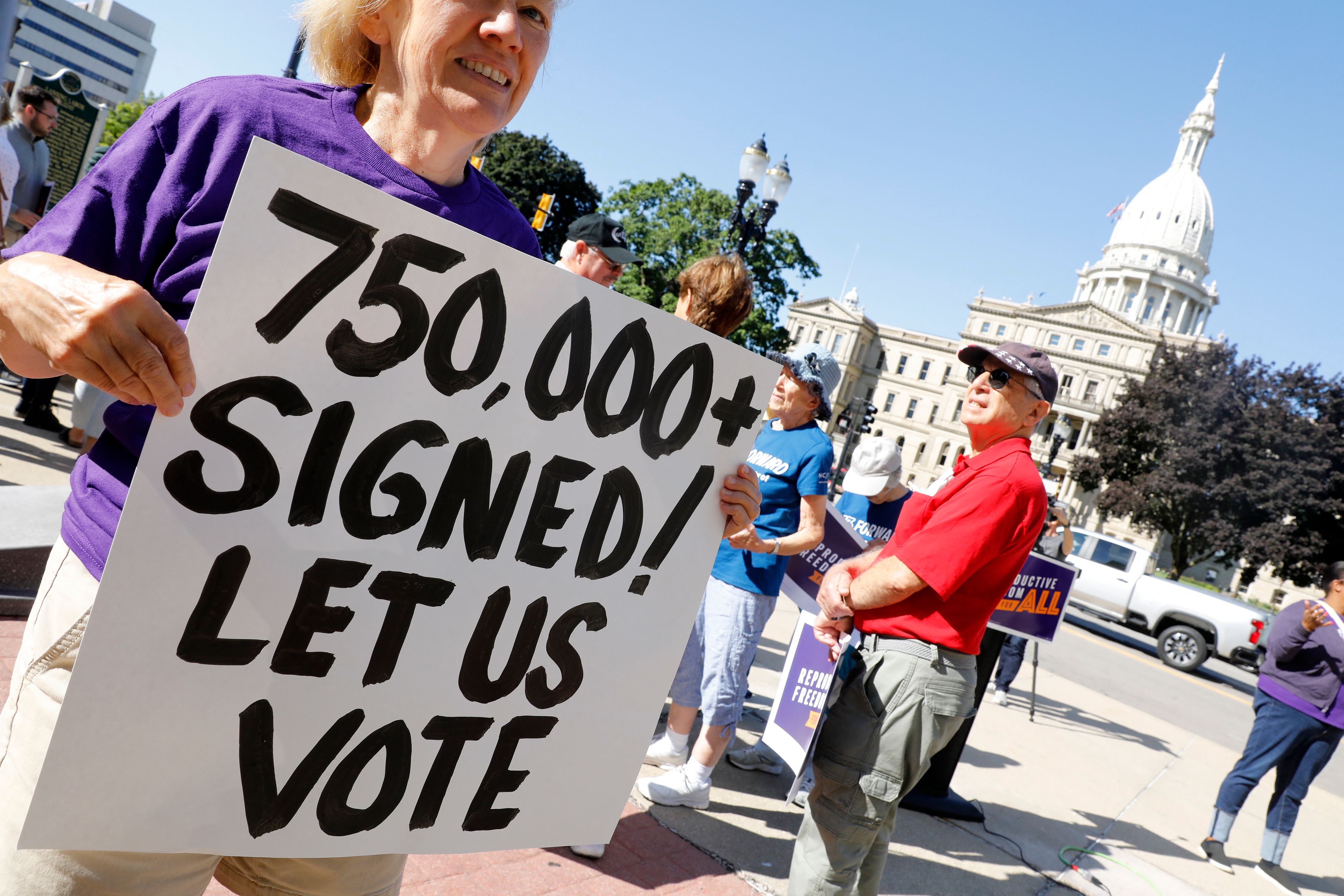Abortion remains legal in Michigan after judge permanently strikes down 1931 anti-abortion law
Judge determines nearly century-old law would ‘force pregnant women to forgo control of the integrity of their own bodies’ regardless of impacts to health and lives
A judge in Michigan has granted a permanent injunction to block prosecutors from enforcing the state’s nearly century-old anti-abortion law.
The ruling from Michigan Court of Claims Judge Elizabeth Gleicher declares the 1931 law unconstitutional and aims to permanently block its enforcement.
Her ruling on 7 September comes after a circuit court judge in Oakland County granted a preliminary injunction last month, arguing that the 1931 law “simply does not pass constitutional muster.”
Michigan’s 1931 law, drafted decades before the landmark US Supreme Court decision in Roe v Wade overturned state-level bans, was ostensibly in effect with the collapse of that 1973 precedent after the 24 June high court ruling that revoked a constitutional right to abortion care nationwide. Michigan’s law would ban abortion in nearly all instances except to protect the life of the patient.
Abortion rights advocates in the state are also pressing Michigan’s Supreme Court to override a state board’s rejection of a measure that would allow voters in the state to decide whether Michigan’s constitution protects the right to abortion.
In a filing on 1 September, Reproductive Freedom for All said the state’s Board of State Canvassers “abandoned its clear legal duty” by rejecting a petition to put the question on November ballots.
On 31 August, the four-member panel deadlocked on a proposal to put the constitutional amendment on ballots this fall – because of a spacing issue on the petition.
After petitioners collected more than 750,000 signatures, above and beyond the threshold for getting the referendum on the ballot, the board’s two Republican members shot it down because a spacing error between words on the petition represented “an egregious error”.
Michigan Attorney General Dana Nessel filed a brief in support of Reproductive Freedom for All’s appeal, arguing that the board’s decision “stripped the people of their right to amend their constitution”.

Judge Gleicher’s ruling on Wednesday follows a lawsuit from Planned Parenthood of Michigan seeking to block the 1931 law.
In her ruling, Judge Gleicher determined that by criminalising abortion, the state “prevents a woman who seeks to exercise her constitutional right from controlling her ability to work or go to school, and thereby determining for herself the shape of her present and future life” and “controls her ability to be the mother she wants to be”.
“The statute not only compels motherhood ... it wipes away the mother’s ability to make plans she considers most beneficial for the futures of her existing or desired children,” according to the ruling. “Despite that men play [a] necessary role in the procreative process, the law deprives only women of their ability to thrive.”
If allowed to go into effect, the state’s 1931 law threatens pregnant patients with “irreperable injury” without access to necessary medical care, and represents a “wholesale denial” of a “fundamental right” to such care, the ruling states.
“For 50 years, Michiganders have freely exercised the right to safely control their health and their reproductive destinies by deciding when and whether to carry a pregnancy to term,” Judge Gleicher wrote. “Eliminating abortion access will force pregnant women to forgo control of the integrity of their own bodies, regardless of the effect on their health and lives.”
Legal battles have been playing out across the US against newly enacted anti-abortion laws in the weeks after the Supreme Court’s decision in the case of Dobbs v Jackson Women’s Health Organization, which struck down precedents in Roe v Wade and Planned Parenthood v Casey and handed decisions governing abortion rights to individual states, rather than affirming Americans’ right to abotion care in the US Constitution.
At least 12 states have outlawed abortion entirely in nearly all instances following the ruling, forcing the closure of more than 40 clinics and denying access to care for millions of women and girls.
Join our commenting forum
Join thought-provoking conversations, follow other Independent readers and see their replies
Comments
Bookmark popover
Removed from bookmarks